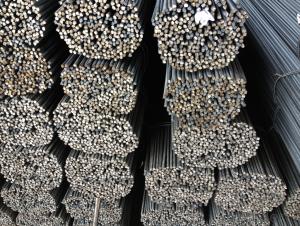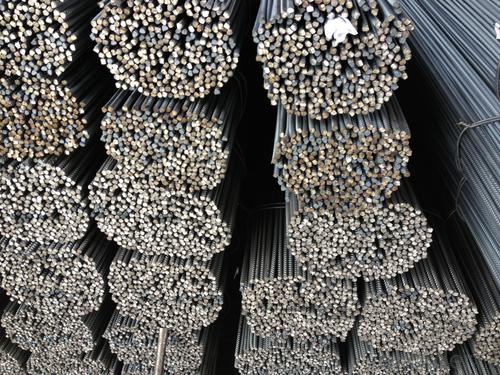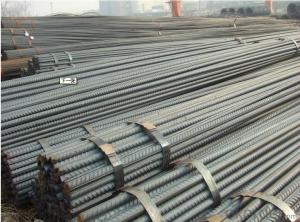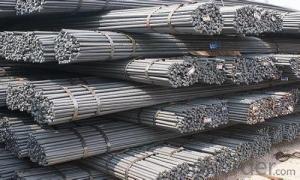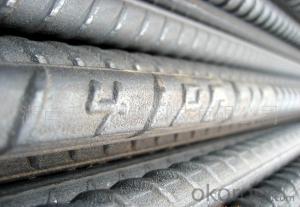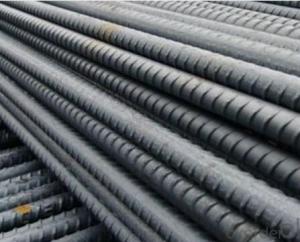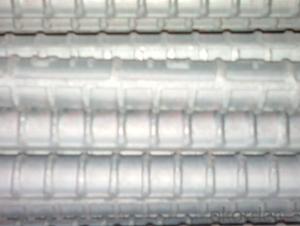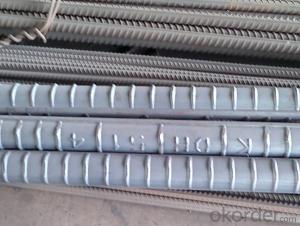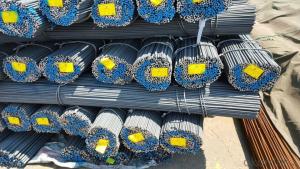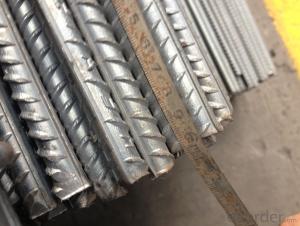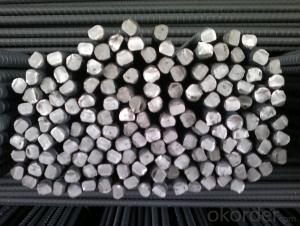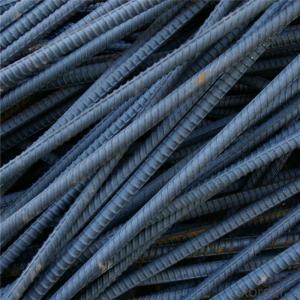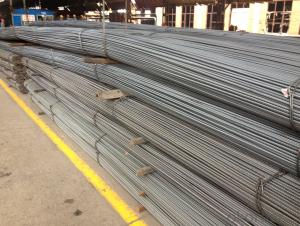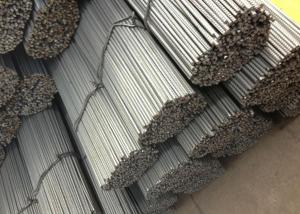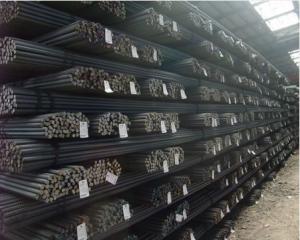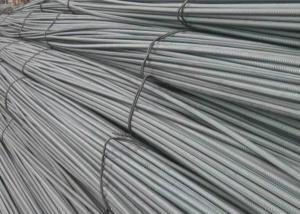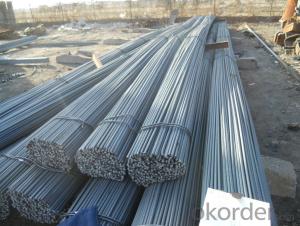Hot Rolled Deformed Steel Rebars ASTM GR40, GR60
- Loading Port:
- Shanghai
- Payment Terms:
- TT or LC
- Min Order Qty:
- 100 m.t.
- Supply Capability:
- 200000 m.t./month
OKorder Service Pledge
OKorder Financial Service
You Might Also Like
OKorder is offering Hot Rolled Deformed Steel Rebars ASTM GR40, GR60 at great prices with worldwide shipping. Our supplier is a world-class manufacturer of steel, with our products utilized the world over. OKorder annually supplies products to African, South American and Asian markets. We provide quotations within 24 hours of receiving an inquiry and guarantee competitive prices.
Product Applications:
Hot Rolled Deformed Steel Rebars ASTM GR40, GR60 are ideal for structural applications and are widely used in the construction of buildings and bridges, and the manufacturing, petrochemical, and transportation industries.
Product Advantages:
OKorder's Hot Rolled Deformed Steel Rebars ASTM GR40, GR60 are durable, strong, and wide variety of sizes.
Main Product Features:
· Premium quality
· Prompt delivery & seaworthy packing (30 days after receiving deposit)
· Can be recycled and reused
· Mill test certification
· Professional Service
· Competitive pricing
Product Specifications:
Manufacture: Hot rolled
Grade: Gr40,Gr60 etc
Certificates: ISO, SGS, BV, CIQ
Length: 6m – 12m, as per customer request
Packaging: Export packing, nude packing, bundled
Deformed Steel Bar | ||
Diameter (MM) | Cross Sectional Area (MM2) | Theorectical Weight (KG/M) |
6 | 28.27 | 0.222 |
8 | 50.27 | 0.395 |
10 | 78.54 | 0.617 |
12 | 113.1 | 0.888 |
14 | 153.9 | 1.21 |
16 | 201.1 | 1.58 |
18 | 254.5 | 2 |
20 | 314.2 | 2.47 |
22 | 380.1 | 2.98 |
25 | 490.9 | 3.85 |
28 | 615.8 | 4.83 |
32 | 804.2 | 6.31 |
36 | 1018 | 7.99 |
40 | 1257 | 9.87 |
FAQ:
Q1: Why buy Materials & Equipment from OKorder.com?
A1: All products offered byOKorder.com are carefully selected from China's most reliable manufacturing enterprises. Through its ISO certifications, OKorder.com adheres to the highest standards and a commitment to supply chain safety and customer satisfaction.
Q2: How do we guarantee the quality of our products?
A2: We have established an advanced quality management system which conducts strict quality tests at every step, from raw materials to the final product. At the same time, we provide extensive follow-up service assurances as required.
Q3: what is the difference between actual weight and theoretical weight?
A3: All the section steel has two weights: actual weight and theoretical weight. Actual weight is the weighing out when the product delivered from the mill. Theoretical weight is calculated by pieces. The invoice can be based on each of them as your request.
Images:
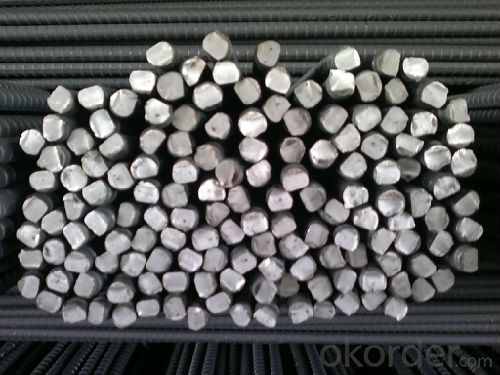
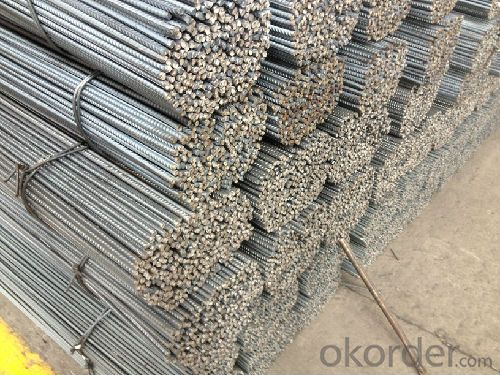
- Q: Are there any limitations or restrictions on using steel rebars in construction?
- Steel rebars in construction have certain limitations and restrictions. Here are some of them: 1. Corrosion: Moisture and certain chemical environments can cause steel rebars to corrode, weakening them over time and compromising the structural integrity of the construction. To address this limitation, protective coatings or stainless steel rebars can be employed. 2. Fire Resistance: When exposed to high temperatures during a fire, steel rebars can lose strength and become malleable, leading to potential structural failure. Fireproof coatings or concrete encasement can enhance the fire resistance of steel rebars. 3. Weight: Large-scale construction projects may face challenges in transportation, handling, and installation due to the significant weight of steel rebars. Additional labor or equipment may be necessary, increasing project costs. 4. Thermal Expansion: Steel's high coefficient of thermal expansion causes it to expand and contract significantly with temperature changes. This can result in thermal stresses and concrete cracking around the rebars. Proper design techniques and the use of expansion joints can mitigate this limitation. 5. Electromagnetic Interference: Steel rebars can interfere with electromagnetic signals used in communication systems or sensitive electronic equipment, which is crucial to consider when constructing buildings with specific requirements, such as hospitals or laboratories. 6. Cost: The cost of steel rebars can fluctuate based on market conditions, availability, and quality, impacting the overall budget of construction projects, especially when large quantities are needed. It is important to acknowledge that despite these limitations, steel rebars are widely used in construction due to their strength, durability, and availability. Proper design, construction techniques, and maintenance can help overcome these limitations, ensuring the safe and efficient use of steel rebars in buildings and infrastructure.
- Q: How are steel rebars stored on-site?
- Steel rebars are typically stored on-site in a designated area that is clean, dry, and well-ventilated. They are usually stacked horizontally and separated by wooden blocks or spacers to prevent them from touching the ground or each other. Additionally, rebars may be covered with a tarp or protective sheeting to shield them from moisture and dirt. Overall, proper storage of steel rebars ensures easy access, protects their integrity, and promotes safety on the construction site.
- Q: How are steel rebars affected by extreme weather conditions?
- Steel rebars are highly durable and resistant to extreme weather conditions. They can withstand high temperatures, excessive moisture, and even freezing temperatures without significant damage or corrosion. However, prolonged exposure to extreme weather conditions, such as constant moisture or salty environments, can cause rust and corrosion on the surface of the rebars, which can weaken their structural integrity over time. Therefore, proper maintenance and protective coatings are necessary to ensure the long-term effectiveness of steel rebars in extreme weather conditions.
- Q: Can steel rebars be bent without compromising their strength?
- Yes, steel rebars can be bent without compromising their strength if done within their specified bending limits and with proper techniques.
- Q: How do steel rebars contribute to the strength of concrete?
- Steel rebars contribute to the strength of concrete in several ways. Firstly, they enhance the tensile strength of concrete, which is otherwise relatively low. While concrete is excellent in compression, it is weak when it comes to resisting tension. This is where steel rebars come into play. By embedding them within the concrete, they provide additional strength and help prevent the formation and propagation of cracks. Secondly, steel rebars improve the bond between concrete and the reinforcement material. The ribbed surface of the rebars creates a better grip with the concrete, ensuring a stronger bond. This bond is crucial as it allows the concrete and steel to work together, distributing the loads and minimizing the risk of structural failure. Furthermore, steel rebars increase the overall durability and longevity of concrete structures. They resist corrosion, which is a significant concern in coastal or high humidity areas. The corrosion resistance of rebars ensures that the concrete remains structurally sound for a longer period, reducing maintenance costs and extending the lifespan of the structure. In addition to their strength-enhancing capabilities, steel rebars also contribute to the structural stability of concrete elements. They assist in reinforcing critical areas such as beams, columns, and foundations, where high loads and forces are present. By providing additional support and reinforcement, steel rebars help prevent excessive deflection, bending, or failure of these elements under heavy loads. In summary, steel rebars play a vital role in enhancing the strength of concrete structures by improving tensile strength, bond strength, durability, and overall structural stability. Their incorporation in concrete elements is essential for ensuring the longevity and safety of various construction projects.
- Q: Can steel rebars be replaced with other reinforcement materials?
- Yes, steel rebars can be replaced with other reinforcement materials. While steel rebars have been widely used in construction for their strength and durability, alternative materials have been developed that offer similar or even improved properties. One such alternative is fiber-reinforced polymer (FRP) bars, which are made of high-strength fibers embedded in a polymer matrix. FRP bars are lightweight, corrosion-resistant, and have a high tensile strength, making them an attractive replacement for steel rebars. They are also non-conductive and non-magnetic, making them suitable for use in areas with electromagnetic interference or in sensitive industries such as electronics. Another alternative is carbon fiber reinforced polymer (CFRP) bars, which are similar to FRP bars but are specifically reinforced with carbon fibers. CFRP bars offer even higher tensile strength and stiffness compared to steel rebars, making them particularly suitable for structures that require exceptional load-bearing capabilities. Furthermore, natural fiber reinforced composites (NFRC) have also been explored as a replacement for steel rebars. NFRC can be made from materials such as bamboo, jute, or sisal fibers embedded in a matrix material like cement or polymer. These natural fibers offer good tensile strength and can be a sustainable and cost-effective alternative to steel rebars, especially in regions where these fibers are abundantly available. In conclusion, while steel rebars have been the traditional choice for reinforcement materials in construction, alternatives such as FRP bars, CFRP bars, and NFRC can be viable substitutes. The choice of reinforcement material depends on various factors such as structural requirements, environmental conditions, and cost-effectiveness.
- Q: How are steel rebars protected against chemical corrosion?
- Steel rebars are protected against chemical corrosion through a process called corrosion inhibition. This involves applying a protective coating, such as epoxy or zinc, to the surface of the rebars. Additionally, rebars can be embedded in concrete, which acts as a barrier against corrosive substances. Proper maintenance and regular inspections are essential to ensure the long-term protection of steel rebars against chemical corrosion.
- Q: What is the role of steel rebars in the construction of foundations?
- Steel rebars play a crucial role in the construction of foundations by providing structural reinforcement and strength. They are embedded within the concrete to enhance its tensile strength and help distribute loads evenly, preventing cracks and structural failure. Rebars also act as a bonding agent between the concrete and the foundation, ensuring stability and durability in the overall construction.
- Q: What are the specifications of thread steel?
- China's standard recommended nominal diameter of 6, 8, 10, 12, 16, 20, 25, 32, 40, 50mm thread steel series.The supply length is divided into two kinds: foot length and foot length.China's export screw length selection range is 6 ~ 12m,The selection length of Japanese thread steel is 3.5 ~ 10m;Domestic sales of domestic thread steel, if the contract does not specify requirements, usually fixed length of 9m, 12m two length.
- Q: Are there any alternatives to steel rebars in construction?
- Yes, there are alternatives to steel rebars in construction. Some common alternatives include fiberglass rebars, carbon fiber rebars, and basalt rebars. These alternatives offer advantages such as being lightweight, corrosion-resistant, and having high tensile strength. Additionally, materials like bamboo, timber, and certain polymers can also be used as alternatives to steel rebars in specific construction applications.
Send your message to us
Hot Rolled Deformed Steel Rebars ASTM GR40, GR60
- Loading Port:
- Shanghai
- Payment Terms:
- TT or LC
- Min Order Qty:
- 100 m.t.
- Supply Capability:
- 200000 m.t./month
OKorder Service Pledge
OKorder Financial Service
Similar products
Hot products
Hot Searches
Related keywords
